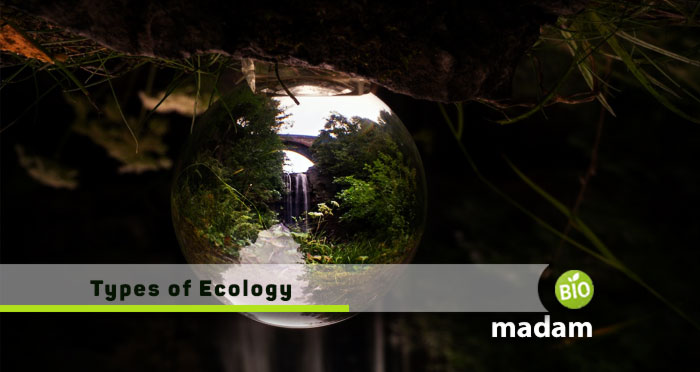Different living and nonliving elements in a region interact with each other in ecosystems and biomes. The ecosystem comprises the living and nonliving organisms in a region. Thus, ecology refers to the relationship of organisms with their surroundings. Depending on the components of the system, ecologies are categorized into different types.
Let’s tell you about ecology and different types of ecologies in detail.
What is Ecology?
Ecology deals with organisms and how they interact with other organisms and environments. Ecological studies are done on different levels, such as organisms, communities, populations, habitats, ecosystems, biomes, and biosphere. Various mathematicians, physicists, chemists, and engineers use scientific techniques. Furthermore, ecologists play a major role in determining the features and relationships in ecology.
Ecologists study the relationship between the components in habitats of different sizes. They comprise all eukaryotic, prokaryotic and non-living aspects. Apart from that, they also learn about different kinds of environments, such as plants in forests or oceans, etc. The main aim of an ecologist is to improve and develop the understanding of adaptation, life processes, interaction, and biodiversity of organisms. The information gathered by ecologists affects the environment and the Earth’s future. It allows them to come up with ideas for land management and development.
Components of Ecology
The fundamental purpose of ecology is to understand the biotic and abiotic components of ecology. This helps understand the distribution and interaction of living and nonliving things in the environment. These interactions between the components of ecology maintain equilibrium in an environment.
Abiotic Components
Abiotic factors include all the nonliving components and physical elements in an ecosystem. These components include sunlight, moisture, soil, minerals, etc. Such features are obtained from the environment.
Abiotic factors in ecology may also include water pH, salinity, oxygen, dissolved nutrients, temperature, rain, wind, etc. The sun typically acts as the energy source and helps plants produce food through photosynthesis.
All the molecules in a specific type of ecology contribute to food production, which travels through the food chain, releasing important molecules at the end. These molecules are used again, and the cycle continues.
Biotic Components
The biotic components of ecology comprise all living organisms in the ecosystem. They include bacteria, parasites, plants, animals, and fungi. All the biotic components in ecology are divided into three categories: producers, consumers, and decomposers, that can either be autotrophs, heterotrophs, or saprotrophs.
Plants are typically the producers in the ecosystem as they are autotrophs and produce their food themselves. Herbivores, carnivores, and omnivores make up the consumers and rely on other organisms for survival. Lastly, fungi, bacteria, and archaebacteria decompose biotic factors that convert decaying organic matter into nitrogen and CO2.
The biotic and abiotic elements of ecology are connected to each other through nutrition and energy flow. There are no specific boundaries regarding the interaction. Yet, any changes in the ecosystem disturb the relationship between the components and affect the ecology of that region.

Types of Ecology
Ecologists have classified ecology into different classes according to the components and their relationship. It may also exhibit the level of organization and its overall impact on the environment. Here are the different types of ecology from the smallest organization level to the biome level:
Molecular Energy
The ecology study also focuses on the nutritional concept of proteins and how their production affects organisms and the environment. This interaction will then give rise to a few complex organisms. It relates to living and non-living elements, as everything constitutes atoms and molecules.
Microbial Ecology
Microbial ecology studies the minutest organisms at the cellular level. Ecologists study the relationships of organisms in Protista and Monera with each other and the environment. Microbial ecology allows us to understand the hereditary mechanisms in microbes through the study of RNA and DNA.
Organismal Ecology
Organismal ecology or behavioral ecology relates to the study of the behavior of an organism in an ecosystem. This ecology deals with the individual basis, such as the individual’s anatomy, physiology, and organism behavior. It can be helpful in evolutionary studies as it helps analyze adaptive behaviors throughout the years. Behavioral ecologists learn about the changes in the behavior of organisms and survival threats leading to their specific behavior.
Population Ecology
Population refers to the number of organisms in specific species of the same genus living in the same region. Thus, population ecology helps understand the size and density of a population. It also helps evaluate their migration patterns and the structure of the population. Sometimes the interactions between the members of the same population may explain their relationship with other ecological components.
Community Ecology
Community ecology explains the relationship between different populations living in a particular area. It may include a few or many species of organisms, including plants, animals, algae, fungi, mold, etc. Community ecology also depicts the dependency of one population on another and how changes in a particular population impact another. Ultimately, community ecology also studies food chains and food webs, explaining the producer-consumer relationship between organisms.

Ecosystem Ecology
Ecology is based widely on the ecosystem; however, all the above-mentioned ecologies contribute to ecosystem ecology. Ecosystems and communities offer the most diverse arrangement of organisms to study their relationships in detail. An ecosystem combines the biotic and abiotic factors in the ecology and their interactions. Thus, it provides information about all aspects of the environment.
Landscape Ecology
Landscape ecology emphasizes the role of human impact on the functions of ecology. This landscape ecology deals with the interchange of materials and energy. It also deals with the interaction between organisms in the ecosystem. Landscape ecology helps study the role of organisms in the production and decomposition of matter. It involves various nutrition cycles involved in the production of important organic compounds.
Global Ecology
Global ecology is a comprehensive domain of ecology combining all different types of ecologies affecting the entire globe. It includes all biomes comprising all living organisms, from microbes to individuals and populations.
It includes the study of the environment, their relationship with each other, their interactions with the environment, and how the organisms contribute to the ecosystems.
Deep Ecology
Most types of ecology propose that humans function in opposition to the environment. Yet, deep ecology considers them a part of the environment. It makes more use of political sciences and philosophy than other branches. It does not utilize the traditional ecological evolution methods, comprising proposing a question, creating a hypothesis, and testing it.
Importance of Ecology
To understand more about the importance of ecology, environmental sciences and its components play an essential role. Following topics will further describe the significance of ecology.
Resource Allocation
The first reason to know the importance of ecology is resource allocation. The knowledge of ecology is so essential that it helps us understand how, where and when we should correctly use the resources so that they can benefit both the environment and human beings. A lack of knowledge regarding resource allocation can lead to long-term scarcity and deprivation of resources.
Environment Conservation
Ecology allows us to understand the impact of interactions among organisms and their surroundings. It comprises the study of all different branches of biology to understand organisms. Eventually, we can understand how changing environmental dynamics manually may help conserve energy by addressing the problems. It also protects endangered species by providing them with a suitable environment.
Environment Sustainability
The primary importance of ecology is that it promotes an eco-friendly living environment between species. It also encourages this friendly environment for the lifestyle that protects and saves the ecology of life. When humans tend to feel the need for an eco-friendly approach, it leads to a sustainable environment. Lack of an eco-friendly environment can lead to the spread of multiple infections and diseases and negative nature among human beings.

Energy Conservation
All living and nonliving organisms require energy for proper growth and development. With less knowledge of energy conservation, there are chances for the exploitation of energy resources. These energy resources include radiation, light, and nutrition for the organisms’ growth. Knowing about energy utilization and ways to convert resources into energy helps provide enough to everyone in an ecosystem.
Often, humans do not understand how they are wasting energy by not being mindful of their surroundings. Information about energy utilization can help adopt practices that promote energy conservation.
Proper Resource Utilization
All the benefits of studying ecology are intertwined and enable us to allocate resources properly in an ecosystem. This also allows us to understand the needs of humans as they have the most significant impact on the ecosystem. The importance of carbon compounds and natural resources can help reduce the adverse effects on the global ecology, such as the deterioration of the ozone layer.
Pest and Disease Control
Studying and examining the pests and vectors in an ecosystem helps save crops from unwanted pests and prevents disease transfer. Taking adequate measures can lead to better plant growth and avoid human diseases. It is managed by studying the interactions between pests and parasites and controlling the breeding conditions.
What is Human Ecology?
Humans play a vital role in the ecosystem. The primary focus of human ecology is on the relationship between the environment and humans. It highlights the impact people have on the environment. Besides that, it helps us learn how we can improve ourselves for others and the environment as human beings.
The Bottom Line
Studying the different types of ecology allows us to understand organisms and their interactions with the environment. Ecologists study different levels of ecology, from microscopic organisms to global ecology, to find out all about different types of co-existing relationships. Ecosystems comprise biotic and abiotic factors that assess different aspects of ecology. It includes animals, plants, fungi, algae, mosses and microscopic ecological components. Understanding ecology helps conserve energy, allocate resources properly, and control diseases.
FAQs
What is the importance of ecology?
Ecology gives us knowledge about the interactions and relationships between living and nonliving organisms in the ecosystem. It is critical for maintaining energy resources, sustaining biodiversity, food production, and the wellbeing of living organisms.
What are the 7 principles of ecology?
The seven lenses or principles of ecology mention that nature knows best and that all forms of life are equally important. Furthermore, they say that everything is connected to everything else, changes are inevitable, and everything must go somewhere else. They also mention that nature is beautiful and the Earth is finite.
What is the history of ecology?
Ecology is believed to have evolved from ancient Greeks. Theophrastus was the first to study the interactions between organisms and their environment. It analyzes the relationship between the biotic and abiotic factors in an ecosystem.

Jeannie has achieved her Master’s degree in science and technology and is further pursuing a Ph.D. She desires to provide you the validated knowledge about science, technology, and the environment through writing articles.

